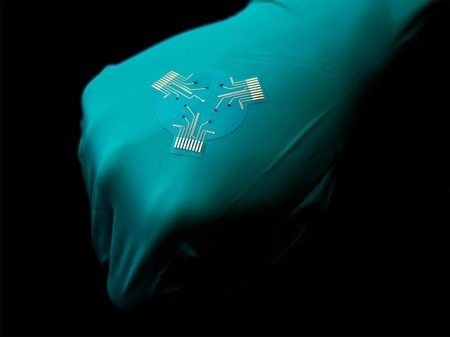At Caltech (California Institute of Technology), a new kind of smart bandage developed may make the treatment of such wounds simpler, affordable, and highly effective. Such smart bandages were fabricated in the laboratory of Wei Gao, assistant professor of medical engineering, Heritage Medical Research Institute Investigator, and Ronald and JoAnne Willens Scholar.

A larger version of the smart bandage. Image Credit: Lance Hayashida/Caltech.
There are many different types of chronic wounds, especially in diabetic ulcers and burns that last a long time and cause huge issues for the patient. There is a demand for technology that can facilitate recovery.
Wei Gao, Assistant Professor and Heritage Medical Research Institute Investigator, California Institute of Technology
Dissimilar to a normal bandage, which may only be comprised of layers of absorbent material, the smart bandages are made from an adaptable and stretchy polymer containing medication and embedded electronics.
The electronics enable the sensor to track molecules like lactate or uric acid and conditions like temperature or pH in the wound that might be indicative of bacterial infection or inflammation.
The bandage has the potential to respond in one of three ways: Initially, it could transmit the collected data from the wound in a wireless manner to a nearby tablet, smartphone, or computer for review by the medical professional or a patient.
Second, it can also deliver an antibiotic or other medication instantly stored inside the bandage to the wound site to treat the infection and inflammation. Third, it could apply a low-level electrical field to the wound to stimulate tissue growth leading to quicker healing.
As far as animal models under laboratory conditions are concerned, the smart bandages displayed the potential to offer real-time updates concerning wound conditions and the metabolic states of the animals to scientists, as well as provide speed healing of chronically infected wounds quite similar to those discovered in humans.
Gao states that the outcomes are promising and adds that additional research in collaboration with the Keck School of Medicine of USC will stress enhancing the bandage technology and testing it on human patients, whose therapeutic needs might be different compared to those of laboratory animals.
We have showed this proof of concept in small animal models, but down the road, we would like to increase the stability of the device but also to test it on larger chronic wounds because the wound parameters and microenvironment may vary from site to site.
Wei Gao, Assistant Professor and Heritage Medical Research Institute Investigator, California Institute of Technology
The study co-authors are postdoctoral scholar research associates in medical engineering Ehsan Shirzaei Sani and Yu Song; medical engineering graduate students Changhao Xu (MS '20), Canran Wang, Jihong Min (MS '19), Jiaobing Tu (MS '20), Samuel A. Solomon, and Jiahong Li; and Jaminelli L. Banks and David G. Armstrong of the Keck School of Medicine of USC.
The study was financially supported by the National Institutes of Health, the National Science Foundation, the Office of Naval Research, the Heritage Medical Research Institute, the Donna and Benjamin M. Rosen Bioengineering Center at Caltech, the Rothenberg Innovation Initiative at Caltech, and a Sloan Research Fellowship.
Journal Reference
Sani, E. S., et al. (2023) A stretchable wireless wearable bioelectronic system for multiplexed monitoring and combination treatment of infected chronic wounds. Science Advances. doi.org/10.1126/sciadv.adf7388.
Source: https://www.caltech.edu/